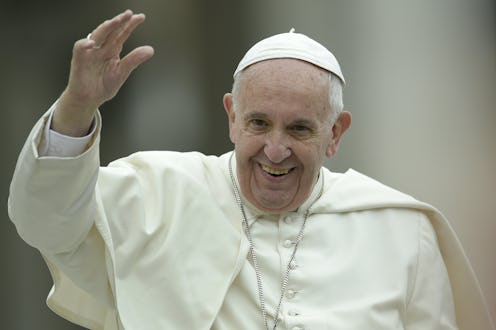News
What You Didn't Notice In The Pope's Marriage Doc
When it was released Friday, Pope Francis' 256-page document on love, sex, and marriage may have at first seemed like another step toward a more open and welcoming Catholic Church. American bishops called the release "groundbreaking," as divorced Catholics across the country may be able to receive communion again — a church tradition they have historically been cut off from because their marriage wasn't annulled. But there is something you didn't hear in the pope's document, Amoris Laetitia ("The Joy of Love" in Latin). It has to do with same-sex couples, but it's not as bad as you think.
Between comments on baptism and single-parent families, Pope Francis addressed "persons who experience same-sex attraction" (the words "gay" or "lesbian" or "queer" would be too simple, I guess). A particularly damning portion talks about relationship recognition, or rather the idea of placing "unions between homosexual persons on the same level as marriage." He's not OK with that:
There are absolutely no grounds for considering homosexual unions to be in any way similar or even remotely analogous to God’s plan for marriage and family.
He goes on to say that it is unacceptable that local churches are pressured on the issue. He also throws in a bit about international donations to developing countries being dependent on LGBT-friendly legislation, saying that's not OK either. In other words, he's not feeling the gay agenda.
Does that sound like the same old, same old? That's because it is. Pope Francis is actually quoting a 2003 church document called Considerations Regarding Proposals to Give Legal Recognition to Unions between Homosexual Persons. The paper was released during the papacy of Pope John Paul II. Pope Benedict — then Cardinal Joseph Ratzinger — signed the document.
Pope Francis, therefore, didn't use his own words for the harshest condemnation of same-sex relationships. He does mention other points in the document, though. Earlier in the text, when Pope Francis discusses the "weakening of marriage," he mentions same-sex unions too:
We need to acknowledge the great variety of family situations that can offer a certain stability, but de facto or same-sex unions, for example, may not simply be equated with marriage. No union that is temporary or closed to the transmission of life can ensure the future of society.
Acknowledging same-sex relationships — arguably one of the "variety of family situations" that he speaks of — would be a step in the right direction, if not quite the game-changer that endorsement of same-sex marriage would have been.
Francis's writing focused on pastoral care — how priests treat the members of their congregations. One thing that would change if Francis has his way? Gay congregants should be treated with respect and dignity. People should not be discriminated against over their sexuality:
We would like before all else to reaffirm that every person, regardless of sexual orientation, ought to be respected in his or her dignity and treated with consideration, while ‘every sign of unjust discrimination’ is to be carefully avoided, particularly any form of aggression and violence.
He says this in the context of families struggling to come to terms with having a gay or questioning child, something that is "not easy either for parents or children," he writes. He tells priests to give such families "respectful pastoral guidance." Why? "So that those who manifest a homosexual orientation can receive the assistance they need to understand and fully carry out God’s will in their lives." Besides the funky language — I don't know anyone who "manifested" their homosexuality — the idea that such a person can carry out God's will sure sounds inclusive. Let's just hope God's will is not to get married.
In the end, what will matter most is how the Pope's teachings are carried out by local priests. This document might give them wiggle room to be a lot more tolerant and compassionate toward LGBT congregants and their families. And despite the contradiction regarding relationship recognition, that's still a step in the right direction.
